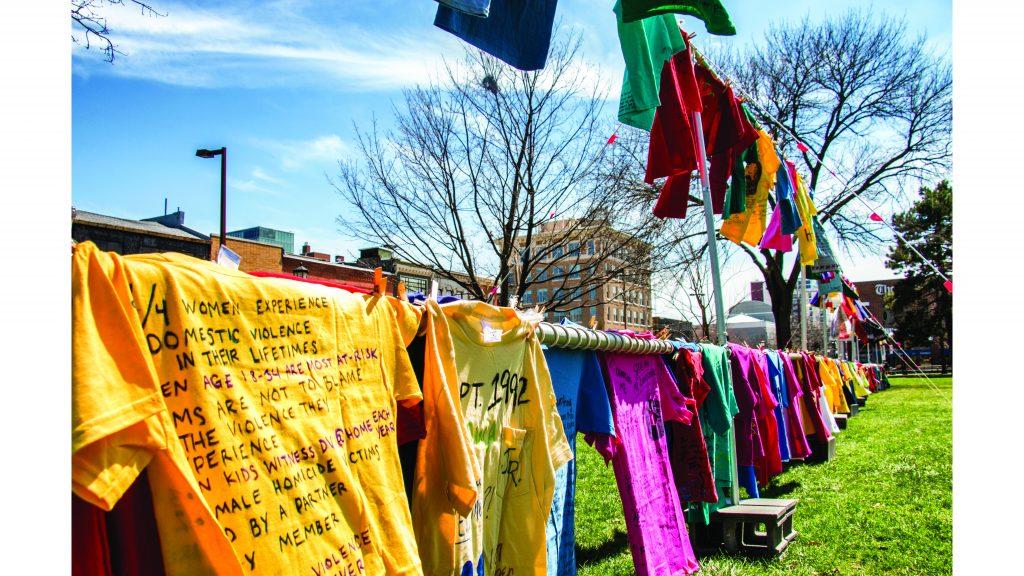RVAP’s annual Clothesline Project reminds the community about sexual and domestic assault through the use of T-shirts.
By Maria Kuiper
maria-kuiper@uiowa.edu
On most sunny spring afternoons, students can be seen lounging around the Pentacrest. However, on Wednesday, students came together to raise awareness for a darker issue.
The Clothesline Project is a national event, and Iowa City’s local project is put on by the Rape Victim Advocacy Program. Its main focus is to highlight the common acts of sexual and domestic assault, homophobic violence, hate crimes, and even homicide.
The University of Iowa’s Office of the Sexual Misconduct Response Coordinator released a report in 2016 that listed the UI having 123 reported sexual assaults, 124 sexual-harassment reports, 107 dating/domestic-violence reports, and 94 stalking reports. The study is two years old and does not count unreported acts of violence.
However, the UI Police Department’s 2017 report shows 41 incidents of rape, 35 incidents of fondling, 32 incidents of domestic violence, 22 incidents of dating violence, and 99 incidents of stalking.
Data from the Office of the Sexual Misconduct Response Coordinator reflect reports of incidents that happened in the context of a person’s UI affiliation as well as incidents that happened off campus or prior to a person coming to the UI. The UIPD report is released in compliance with the Clery Act, which requires colleges and universities participating in federal financial aid programs to maintain and disclose campus crime statistics and security information.
RVAP has been collecting T-shirts, made by local survivors and victims of violence, for 20 years. RVAP works with the Domestic Violence Intervention Program, Monsoon, and Nisaa. Susan Junis, the assistant director of Prevention and Outreach at RVAP, said after the project is displayed annually, students and citizens of Iowa City will want to make and donate shirts.
RVAP partners with a different student organization every year. Junis said the project works with different student groups to represent the underrepresented. This year, the South Asian Student Alliance helped put on the event.
“We partner with many groups with different intersections of violence that show how marginalized groups are affected by violence,” Junis said.
RELATED: Take Back the Night raises up voices of survivors
Aman Sharma, the president of the South Asian Student Association, said that because his organization is up-and-coming, he wanted to be involved with activities that were unique.
“I think the statement [the Clothesline Project] makes is awesome,” he said. “When I first learned about it, I didn’t realize how huge the exhibit actually was.”
Nailah Roberts, the RVAP campus prevention-education coordinator, said the main thing that was different for this year is that there seems to be an overall consciousness about the issue of sexual and domestic assault.
“A lot of people are curious about how this relates to the #MeToo movement,” Roberts said. “This is a good sign because people are thinking about the images they see in the community and how that relates to things on a nationwide scale.”
The hundreds of T-shirts that portray stories are shown through colors. Red, pink, and orange signify survivors of rape or sexual assault, yellow shows survivors of physical and domestic assault, blue and green indicate survivors of incest or childhood sexual abuse, purple shows survivors of attacks based on their sexual orientation, and white shirts represent victims murdered.
This exhibition, along with other recent presentations and demonstrations, are a result of April being Sexual Assault Awareness Month.



